The Globe and Mail proclaimed Lane Winslow was “a terrific series” by “a writer to watch.” Iona Whishaw‘s period detective series takes place in Canada immediately after the Second World War. Protagonist Lane Winslow is a retired intelligence officer and amateur sleuth who moved to the small (fictional) town of King’s Cove in the interior of BC hoping to put her demons to rest—but she can’t find a tranquil life when there are murderers to catch.
The fourth book in the series, It Begins in Betrayal (TouchWood Editions) comes out in April. We caught up with Iona to discuss detective stories, her writing inspirations, and her life as a writer.
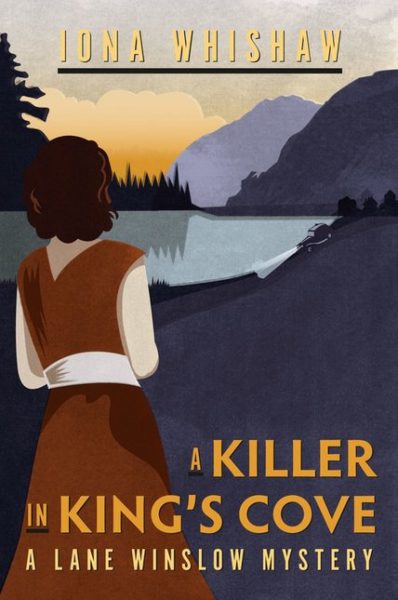 You’ve published in multiple genres—short fiction, poetry, poetry translation, and children’s fiction—and the Lane Winslow series is your first foray into adult fiction genre. How did you get started?
You’ve published in multiple genres—short fiction, poetry, poetry translation, and children’s fiction—and the Lane Winslow series is your first foray into adult fiction genre. How did you get started?
I have always written on and off, and dreamed of one day writing a detective series. I have a degree from UBC, but I started this series about two years before I retired, as I knew I would want to be writing in retirement.
What are the key qualities you want in a book (as a writer or a reader)?
First and foremost I love characters that I would call “humane,” that regardless of their flaws or temperament, have the qualities of empathy and intelligence. A corollary to that is that I am interested in relationships and how they develop. I like my female protagonists to be strong and I like humour. As to action, I like to see action develop naturally out of the drives, dilemmas and needs of the characters.
The first three books, A Killer in King’s Cove, A Death in a Darkening Mist, and An Old, Cold Grave, were all published in just two years. What was the impetus for the Lane Winslow Mystery series?
The inspiration for the series comes from several things coming together. My mother, who, like all our mothers, had a whole life before she had me, seemed to live for adventure, and did work in intelligence during the war where she and my father lived in South Africa. Her own father was a spy as well in the previous war and well into the second war before he was killed in ’43. So that gave me a starting picture of the character I wanted to write about, not my mother, obviously, but definitely inspired by her.
And finally, I also love the place where I spent my early childhood and it seemed ideal to set a mystery series there, and have Lane Winslow’s house be the very real house I lived in, which my mother bought, for the whole of her and our very transient life was her favourite and most regretted house. It has been a labour of love for me, because the “King’s Cove” to give it its fictional name, of that era, is gone forever, wiped away by the influx of new people in the 60s, and it is a way for me to hang on to it, to give that old bygone world some life. Happily, the people who live there now have done a wonderful job of preserving many aspects of the community’s history.
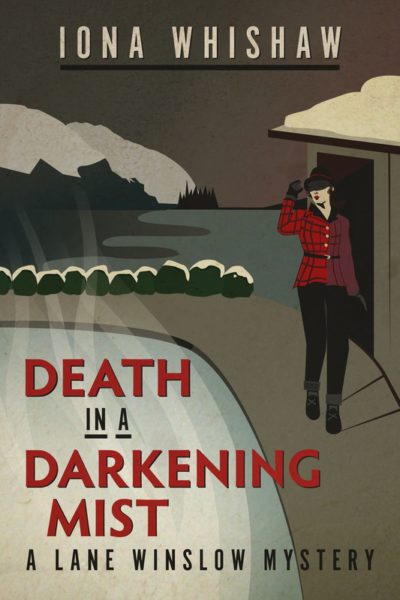 How do you come up with the mystery to be solved, and how do you decide when it’s done?
How do you come up with the mystery to be solved, and how do you decide when it’s done?
The mystery for me always starts with a kind of “scene” in my head. I know nothing else about the story to come then that first scene. In A Killer in King’s Cove, it was Lane Winslow standing in the hall of the house she has just bought. In the second, Death in a Darkening Mist, it was a scene of Lane Winslow sitting in the dark of the tunnel of the local hot springs and being startled by someone speaking Russian. In the third book, An Old, Cold Grave, I imagined one of the ladies of the community going into her root cellar and finding skeletal remains.
Often I put myself into difficulties immediately. Why was he shot at the hot springs? How did no one hear it? Whose skeleton is it? How did it get there? How could someone bury a body in their root cellar and they not know? I spend the rest of the book trying to explain it.
In the forthcoming fourth book, It Begins in Betrayal, I imagined the absolutely correct and unimpeachably honest Inspector Darling in jail. In a way, the reader is discovering it as I am having Lane Winslow try to understand.
I think I feel that a story is “done” when the issues that led to the death of the victim in the stories are explored and resolved in some way. Deaths like that always involve secrets. I (and my readers, I expect) want to understand what those secrets are and how they led to such a final end. In common with most detective fiction, the story itself is done when the killer is revealed.
Your mystery novels, as period detective stories, could also be considered historical fiction. Why did you want to set them in post-war Canada?
I like writing about the past, especially detective fiction. The post-war period fascinates me because it was such a fulcrum in social change—soldiers were often changed by their experiences and had to come home to society also in the grip of change. Women had a place in public life they’d never had, and many people were really struggling.
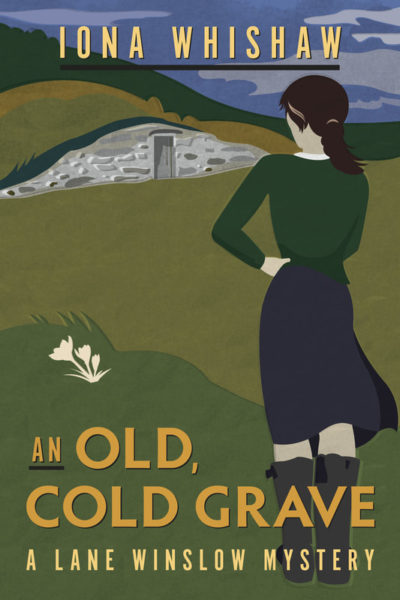 At the same time—as is usual when there are massive forces for social change—you have the resistance, the desire to cling to the values and certainties of the past. The Canada of that period was nothing like the country we know now. It was Anglo in all its attitudes and values. Canada was very slow to take refugees, for example, and people were not very accepting of immigrants who did not fit that British mould. It provides an opportunity to explore the tensions of this change.
At the same time—as is usual when there are massive forces for social change—you have the resistance, the desire to cling to the values and certainties of the past. The Canada of that period was nothing like the country we know now. It was Anglo in all its attitudes and values. Canada was very slow to take refugees, for example, and people were not very accepting of immigrants who did not fit that British mould. It provides an opportunity to explore the tensions of this change.
I can remember when I was a child what it was like when people weren’t “on the telephone” because they didn’t have a phone in the home. You also had to go through multiple levels of people to make a phone call. People had to wait for letters in the post to know what was going on. If you were lost on the road, or stuck in a snow bank, or lost in the forest, you couldn’t call anyone. These constraints interest me. They require more of people.
As well, it’s a long time ago, about 70 years. The post-war period is the period when my parents had served and were still young. They were both English and had in some ways a very English humour and reserve. I am interested in exploring relationships between those kinds of people, and the people around them because they are in such contrast to the “blab about everything” generations that followed them. I’m also very interested in portraying the strong women of that time. My mother was always doing things she wasn’t “supposed” to, and in fact, she was so strong that I was genuinely surprised when I first learned that men were supposed to be ‘stronger’ than women.
What are you reading and what do you recommend?
I’m always reading detective fiction along with anything else. At the moment I’m reading James Runcie’s Grantchester series, and a wonderful book about London in the bombing called The Great Fire by Shirley Hazzard.
Read local! Not to be missed is the wonderful novel by Aislinn Hunter’s The World Before Us, a gripping literary mystery involving the ghostly layering of two periods of time. I’ve just finished reading Sam Wiebe’s Invisible Dead, a great young BC detective writer. A great wartime book is Birds Eye View by Elinore Florence.
Who is your favourite hero/heroine (fictional or real)?
Hard one! So many! In order of time, Elizabeth Bennet is number one of my fictional heroines. Lord Peter Wimsey and his companion in detection Harriet Vane. As well Porfiry Rostnikov, and Abe Liebermen, two wonderful detectives invented by the great writer Stuart Kaminsky.
What is the one book that you wish you wrote, and why?
There are a million of these as well—nearly every book I ever loved! I wish I’d written Wolf Hall by Hilary Mantell because it’s brilliantly written immersive storytelling. More recently I was raving about Everyone Brave Is Forgiven by Chris Cleave. I’m a huge and envious fan of the British writer Kamila Shamsie. Her books are novels set in historical times that explore the nature of relationships across cultures. I think they are transcendent.
Where do you write, and what do you surround yourself with when you write?
We have a spare room in our apartment, and I always write first thing in the morning with my pink fluffy bathrobe on, sitting on the bed with the Macbook perched on a pillow on my lap.
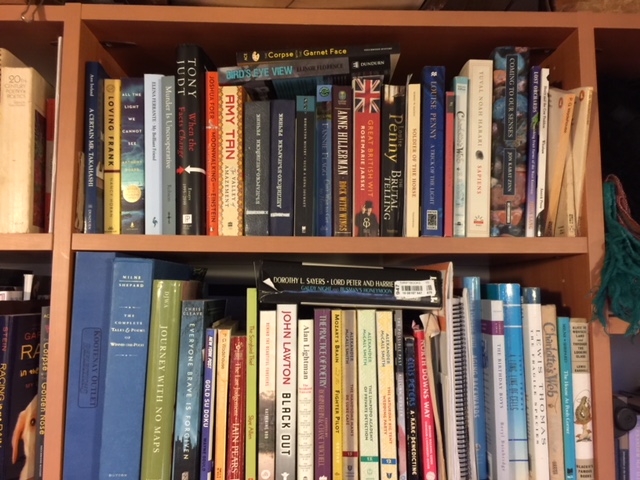
What is your favourite thing to eat or drink while writing?
Because of that early morning writing schedule, I always make myself a pot of very good English tea, and drink that as I write.
The fourth book in your series, It Begins in Betrayal, comes out in April. For me, this would be a great excuse to binge-read the first three books. Is reading the series from the beginning important to the overall plot, or can a reader jump in anywhere?
I think the binge read from the beginning is a great idea. I’ve certainly spoken with people who’ve picked up with the second or third book, but they always want to go back and find out how we got there. They are definitely sequential and are best enjoyed in order.
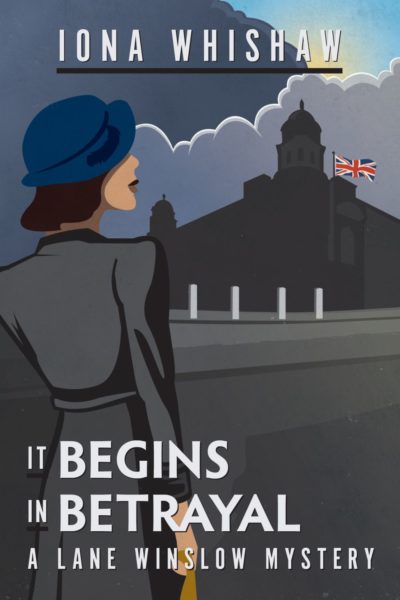 Iona Whishaw has been a youth worker, social worker, teacher and an award-winning high school principal, who continued with her writing throughout her working life. Iona was born in Kimberley, BC, but grew up in a number of different places, including a small community on Kootenay Lake, and now lives in Vancouver, BC. She received her Masters in Creative writing from UBC and has published short fiction, poetry, poetry translation and one children’s book, Henry and the Cow Problem.
Iona Whishaw has been a youth worker, social worker, teacher and an award-winning high school principal, who continued with her writing throughout her working life. Iona was born in Kimberley, BC, but grew up in a number of different places, including a small community on Kootenay Lake, and now lives in Vancouver, BC. She received her Masters in Creative writing from UBC and has published short fiction, poetry, poetry translation and one children’s book, Henry and the Cow Problem.
The Lane Winslow mystery series, which began with A Killer in King’s Cove, is Iona’s first foray into adult fiction. The fourth instalment of the series, It Begins In Betrayal, comes out in April 2018 from TouchWood Editions.

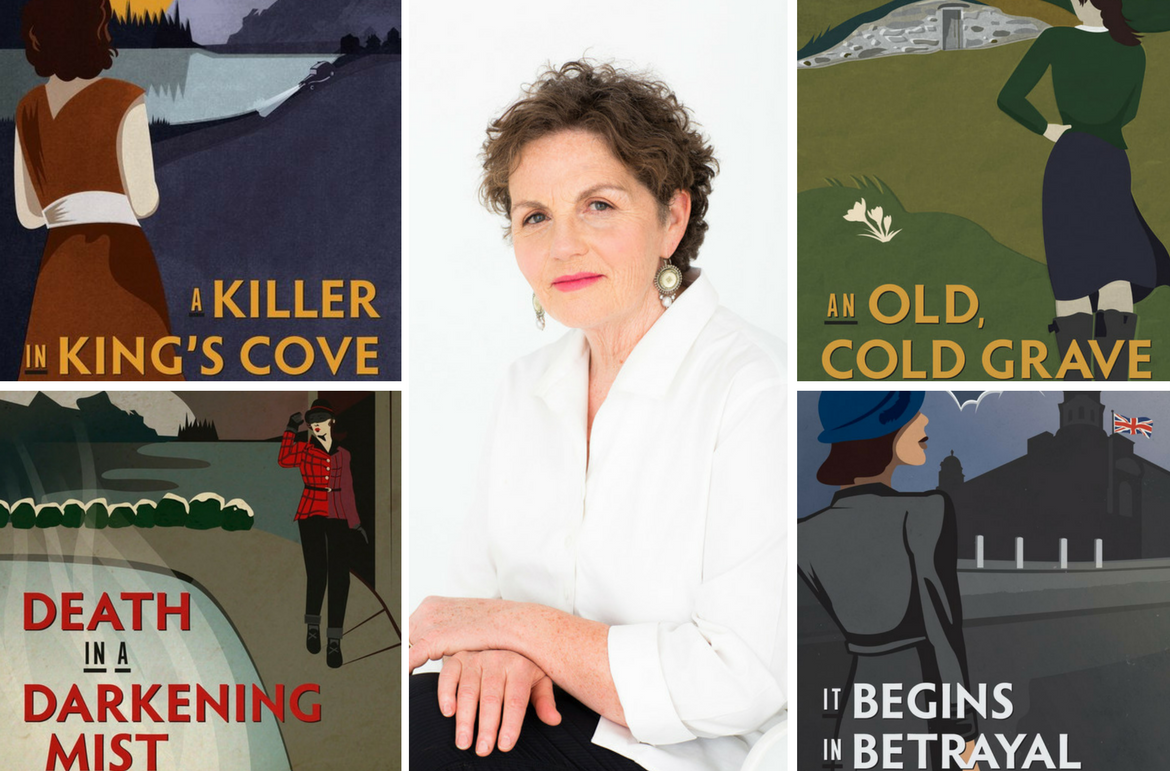
One reply on “Iona Whishaw: “I like my female protagonists to be strong””
I absolutely love your mystery novels and drop all the other books I am reading when I get a notification that one of your books I have on hold is ready to read. I am curious to know if you read, as a child, Katherine Antony Clark’s childrens books,The Golden Pinecone and the Sun Horse. I believe she lived on the eastern point of land up from the Balfour ferry landing. Those stories totally enchanted, me especially so as yours do because I grew up in Trail and spent happy times fly fishing on the Kootenay Lake near the Balfour ferry slip where I caught my biggest trout, a six pounder as the ferry was bearing down on me. I am assuming my comment will be relayed on to Iona Whishaw?